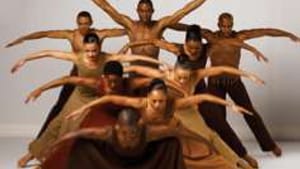Stay in the Loop
BSR publishes on a weekly schedule, with an email newsletter every Wednesday and Thursday morning. There’s no paywall, and subscribing is always free.
Fresh blood for an old legacy
Alvin Ailey at the Merriam

The key question about the Alvin Ailey Company these days is: Can Robert Battle, its artistic director since 2011, breathe vitality into this iconic troupe? The Ailey has had just three directors in its 54 years: Battle succeeded Judith Jamison, who in 1989 followed Ailey, who founded this company in 1958.
The company's recent visit to the Merriam brought some hope that the Ailey troupe could transcend its past and embrace the new and challenging. Of the two programs of new and repertory dance, two works stood out— but these were not the two minor dances offered and choreographed by Battle himself: Strange Humors (1998) and Takademe (1999).
Ronald K. Brown's Grace (1999) embodies the spirituality of Ailey's own choreography, as best manifested in Ailey's grand Revelations (1960), which capped each night of the two programs offered in Philadelphia. But where the movement of Revelations can today appear dated (arms reaching in travail, or reaching in ecstasy, or reaching for salvation), Brown brings a dynamic complexity to similar thematic material while creating a spirituality of the black diaspora.
He uses two interpretations of Duke Ellington's jazzy spiritual "Come Sunday" to begin and close the dance, employing the outstanding Linda Celeste Sims as a central maternal figure; her languid movements and speedy West African dance steps captivate us. Fela Kuti Afro-pop music allows Brown to mix the spirituality with the earthiness of this life; in costumes of red and white (all white at the close), the dancers' flying limbs emblazon the stage with sparks of fire.
Subterranean dance club
Philadelphia's hip-hop choreographer, Rennie Harris, one of the first to bring hip-hop onto the modern dance stage, created Home in 2011, inspired by the winners of that year's "Fight HIV Your Way" contest. Home might be Harris's most emotionally powerful and successful dance to date, and a fitting entry into the Ailey repertory.
Using Dennis Ferrer's music, "Underground is My Home" (with additional music from Raphael Xavier), Harris creates a subterranean, dance-club home, cast in shadowy lighting for an ensemble dressed in casual street clothes. The group alternates between slow and somber movement and the heightened physicality of hip-hop and house dancing. One feels the presence of the fragility of life as the dancers celebrate the quiet joys of their music.
Prayer for salvation
The repeat performances of Revelations remind us of the power of Ailey's legacy. The sellout audiences loved every moment of this spiritual-packed work; and even if the choreography enters into expressive excess, the work lives in the energy of its dancers.
Especially striking for me were Yannick Lebrun's I Wanna Be Ready, an anguished prayer for salvation with focused, minimal movement grounded to one space on stage; and the Sinner Man of Samuel Lee Roberts, Jermaine Terry and Michael Francis McBride, the tortured flight of men anticipating a very different end.♦
To read a response, click here.
The company's recent visit to the Merriam brought some hope that the Ailey troupe could transcend its past and embrace the new and challenging. Of the two programs of new and repertory dance, two works stood out— but these were not the two minor dances offered and choreographed by Battle himself: Strange Humors (1998) and Takademe (1999).
Ronald K. Brown's Grace (1999) embodies the spirituality of Ailey's own choreography, as best manifested in Ailey's grand Revelations (1960), which capped each night of the two programs offered in Philadelphia. But where the movement of Revelations can today appear dated (arms reaching in travail, or reaching in ecstasy, or reaching for salvation), Brown brings a dynamic complexity to similar thematic material while creating a spirituality of the black diaspora.
He uses two interpretations of Duke Ellington's jazzy spiritual "Come Sunday" to begin and close the dance, employing the outstanding Linda Celeste Sims as a central maternal figure; her languid movements and speedy West African dance steps captivate us. Fela Kuti Afro-pop music allows Brown to mix the spirituality with the earthiness of this life; in costumes of red and white (all white at the close), the dancers' flying limbs emblazon the stage with sparks of fire.
Subterranean dance club
Philadelphia's hip-hop choreographer, Rennie Harris, one of the first to bring hip-hop onto the modern dance stage, created Home in 2011, inspired by the winners of that year's "Fight HIV Your Way" contest. Home might be Harris's most emotionally powerful and successful dance to date, and a fitting entry into the Ailey repertory.
Using Dennis Ferrer's music, "Underground is My Home" (with additional music from Raphael Xavier), Harris creates a subterranean, dance-club home, cast in shadowy lighting for an ensemble dressed in casual street clothes. The group alternates between slow and somber movement and the heightened physicality of hip-hop and house dancing. One feels the presence of the fragility of life as the dancers celebrate the quiet joys of their music.
Prayer for salvation
The repeat performances of Revelations remind us of the power of Ailey's legacy. The sellout audiences loved every moment of this spiritual-packed work; and even if the choreography enters into expressive excess, the work lives in the energy of its dancers.
Especially striking for me were Yannick Lebrun's I Wanna Be Ready, an anguished prayer for salvation with focused, minimal movement grounded to one space on stage; and the Sinner Man of Samuel Lee Roberts, Jermaine Terry and Michael Francis McBride, the tortured flight of men anticipating a very different end.♦
To read a response, click here.
What, When, Where
Alvin Ailey American Dance Theater. Choreography by Alvin Ailey, Robert Battle, Ronald K. Brown, Rennie Harris, Yannick Lebrun and others. January 30-February 1, 2013 at Merriam Theater, 260 S. Broad St. (above Spruce). (215) 893-1999 or www.kimmelcenter.org.
Sign up for our newsletter
All of the week's new articles, all in one place. Sign up for the free weekly BSR newsletters, and don't miss a conversation.

 Jonathan M. Stein
Jonathan M. Stein